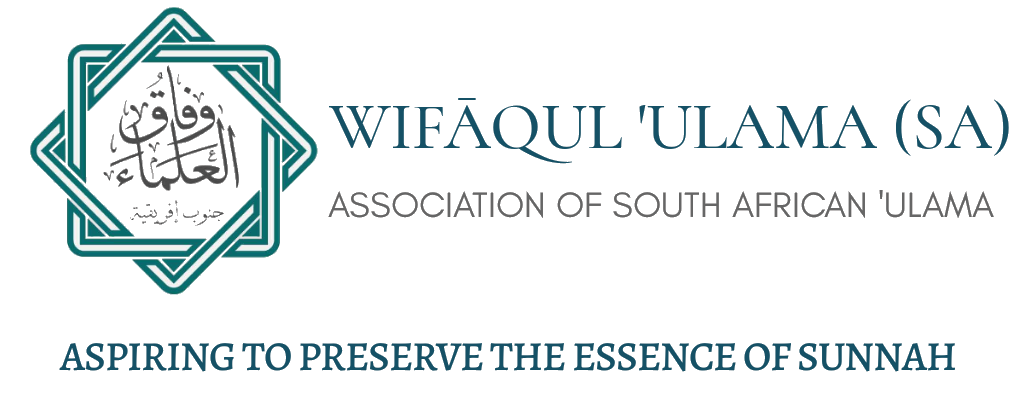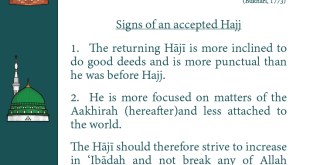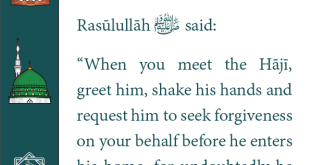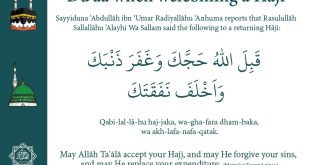The Farewell Hajj – Part 3
Cupping of Rasulullah Sallallahu ‘Alayhi Wa Sallam’s blessed feet
When Rasulullah Sallallahu ‘Alayhi Wa Sallam reached Malal, he performed cupping of his blessed feet. Malal is located between Makkah Mukarramah and Madinah Munawwarah. It is mentioned in Mu’jam al-Buldaan that it is 28 miles from Madinah Munawwarah.
Hunting of a white antelope
As Rasulullah Sallallahu ‘Alayhi Wa Sallam reached Rawha, approximately 74 kilometres away from Madinah Munawwarah (still known by the same name), he encountered a wounded white antelope. Rasulullah Sallallahu ‘Alayhi Wa Sallam instructed the companions to leave it until its owner (i.e., the one who had been hunting it) arrived.
Shortly after, a man from the Bahz tribe, who had inflicted the kill-shot, approached and deferred the decision to Rasulullah Sallallahu ‘Alayhi Wa Sallam, saying, “O Messenger of Allah, it is for you to decide what you wish to do about it.”
In response, Rasulullah Sallallahu ‘Alayhi Wa Sallam instructed Sayyiduna Abu Bakr Radiyallahu ‘Anhu to distribute the meat. Since the person who had hunted the antelope was not in the state of Ihram, Rasulullah Sallallahu ‘Alayhi Wa Sallam did not prohibit consuming its meat. (Sunan Nasai, 2814, p. 679)
After that, Rasulullah Sallallahu ‘Alayhi Wa Sallam journeyed towards Athayah, located en route to J’ufah, approximately 25 Farsakhs or 75 miles from Madinah.
Cupping of Rasulullah Sallallahu ‘Alayhi Wa Sallam’s blessed head
While travelling, Rasulullah Sallallahu ‘Alayhi Wa Sallam performed cupping of his blessed head at a location called Lahyu Jamal. Sayyiduna ‘Abdullah bin ‘Abbas Radiyallahu ‘Anhu narrates that Rasulullah Sallallahu ‘Alayhi Wa Sallam had cupping performed on his head due to a headache he developed near a water place at Lahyu Jamal.
4th stop at ‘Urj
Rasulullah Sallallahu ‘Alayhi Wa Sallam arrived at ‘Urj, a prominent settlement on the route to Madinah Munawwarah, marking the fourth leg of the journey. Situated approximately 14 miles from Raweetha, he decided to make camp there. The luggage of Rasulullah Sallallahu ‘Alayhi Wa Sallam and Sayyiduna Abu Bakr Radiyallahu ‘Anhu was loaded onto a single camel, overseen by the slave of Sayyiduna Abu Bakr Radiyallahu ‘Anhu.
As they settled down, Sayyiduna Abu Bakr Radiyallahu ‘Anhu awaited his slave’s return with food and drink. However, upon the slave’s arrival, the camel was nowhere to be found. Concerned, Sayyiduna Abu Bakr Radiyallahu ‘Anhu questioned the whereabouts of the camel. The slave admitted that it had gone missing since the previous evening. Frustrated by his negligence, Sayyiduna Abu Bakr Radiyallahu ‘Anhu reprimanded the slave, expressing his displeasure through physical chastisement. Rasulullah Sallallahu ‘Alayhi Wa Sallam smiled and said: “Look at this Muhrim! What he is doing” (Abu Dawud – Hadith No. 1818, p. 212)
It is recorded in Zarqani that upon hearing of the lost camel, the family of Fadhalah Aslami Radiyallahu ‘Anhu presented a container of sweets to Rasulullah Sallallahu ‘Alayhi Wa Sallam. Upon which Rasulullah Sallallahu ‘Alayhi Wa Sallam said ‘O Abu Bakr! Look, Allah Ta’aala has provided an excellent meal for us”
Despite this gesture, Sayyiduna Abu Bakr Radiyallahu ‘Anhu remained visibly upset with his attendant. In response, Rasulullah Sallallahu ‘Alayhi Wa Sallam consoled him, reminding him that ultimately, control over matters lies not with them but with Allah Ta’aala. Rasulullah Sallallahu ‘Alayhi Wa Sallam said: ‘O Abu Bakr, remain calm! You and I do not have control over this matter.’
Soon after, Hadhrat Sa’ad and Hadhrat Abu Qais Radiyallahu ‘Anhu arrived with a camel laden with all sorts of provisions. Sayyiduna Sa’ad Radiyallahu ‘Anhu said, ‘O the Nabi of Allah Ta’aala ! We heard that the camel carrying your luggage is missing; please accept this camel with the loaded provision.’ Rasulullah Sallallahu ‘Alayhi Wa Sallam expressed his gratitude and informed them that his camel had been found, and Rasulullah Sallallahu ‘Alayhi Wa Sallam invoked blessings upon them both. (Sharh al-Zarqani, p. 359, vol. 11)
 Wifāq ul Ulāma (SA) ASSOCIATION OF SOUTH AFRICAN 'ULAMA
Wifāq ul Ulāma (SA) ASSOCIATION OF SOUTH AFRICAN 'ULAMA


